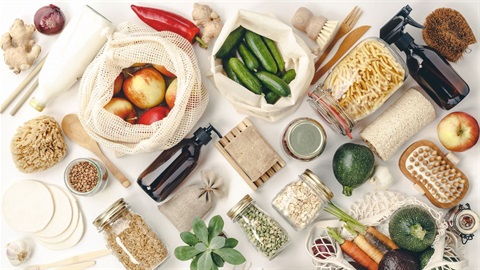Reduce your waste at home

Take our house tour for some eco-inspiration for your home.
Did you know that the average Kiwi sent 730.6kg of household waste to landfill in 2016? That's roughly 55 wheelie bins per person! There's a heap of different ways that we can reduce waste in our homes. From choosing products with less packaging to making some eco-friendly swaps. Every small change makes a difference to your environmental footprint.
There are loads of eco-friendly swaps you can make at home.
Reuse, recycle... and reflect
When making any lifestyle change, it's important to start with small achievable steps. Try monitoring your waste for a week to see what kinds of items go into your bin. Identify if there any products that you can swap for ones with less waste or if there are items that can be reused, recycled, or donated before they go in the bin.
Kitchen
There are plenty of changes that can be made in the kitchen that will save the environment and your wallet.
Meal planning and shopping with a list can help ensure you don't buy products that you don't need. Be sure to check the fridge or pantry before hitting the shops as well, to avoid doubling up on ingredients you already have. Getting only what you need when you need it can help avoid unnecessary waste.
You could also consider lower-waste alternatives – instead of buying vegetables or fruits that are pre-packaged, go for the unpackaged versions and use reusable produce bags. These are generally cheaper as well.
Buying non-perishable items in bulk is also a great way to reduce the amount of plastic you bring home.
When it comes to your kitchen there are also countless environmentally friendly swaps you can make:
- Beeswax wraps (to replace plastic cling film)
- Paper or silicone snack and sandwich bags
- Keep cups (many cafes around Palmy offer a discount if you BYO cup)
- Reusable paper towels
- Washable dish cloths
- Compostable baking paper
- Biodegradable and plastic free dish brushes
- Reusable jars and containers
If you're feeling adventurous you could also try growing your own herbs and vegetables.
The kitchen is arguably the area where you can make the biggest environmental impact in your home.
Bathroom
The average family's bathroom cabinet is filled with plastic bottles, containers, and products.
Start by swapping out some old favourites for waste-free alternatives. Shampoo and shower gel can be brought in the form of soap bars instead of bottles, and items like disposable razors can be swapped for safety razors with changeable blades.
Other alternatives could be swapping nasties like facial or wet wipes (never flush these!) for facecloths or reusable makeup remover pads. Everything from wooden compostable toothbrushes to reusable sanitary products can be found online or at your local health food store.
Bedroom
Yes, there are things we can do to help our environment even in the bedroom, but specifically in our wardrobes. Kiwis spent a whopping $3.63 billion on clothes and shoes in the year ending March 2019, with our 'fast fashion' habits creating roughly 3.6kg of CO2 emissions for every kilogram of clothing we threw out.
To reduce your impact, try to only replace items when you need to. Consider buying items second hand from op shops, renting items or borrowing from friends. Palmy is a leader in this area with some great sustainable small businesses like Girls Go Glam, Common Strangers and Recycle Boutique.
When you're finished with an item of clothing think about donating it (if it's in good condition) – you'll be helping a good cause. Or find a business that recycles textiles.
Living room
We all love to show our families that we love them and often we do that by giving gifts, especially for our kids. Unfortunately, we tend to end up with a lot of items we no longer use or need. Instead of buying toys or games you could join your local toy library to borrow different toys every week or start your own toy swapping group with friends. Next birthday, why not opt for experiences rather than things? The less stuff we buy can ultimately lead to less stuff going to waste.
Laundry
The laundry is another area of your home where you can make some easy changes.
Why not give making your own cleaning products a try? There are plenty of easy recipes online for household sprays, laundry detergents and cleaners that use basic non-toxic ingredients that you probably already have in your pantry.
While you're at it swap out single-use paper towels or wipes for reusable cloths – just pop them in the washing machine when you're done.
If you have young children, you could also consider experimenting with cloth nappies. Around 10 million nappies end up in landfill every single week in New Zealand!